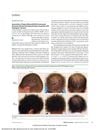4 citations,
July 2018 in “International Journal of Research in Dermatology” Topical finasteride with minoxidil is effective for treating hair loss and may reduce the need for oral finasteride.
 14 citations,
January 2011 in “International Journal of Trichology”
14 citations,
January 2011 in “International Journal of Trichology” Some people with severe, long-lasting baldness responded well to a specific combination treatment.

Combining Minoxidil with topical Dutasteride via microneedling is the most effective and safe treatment for hair loss.

A 14-year-old girl with a condition that makes her hair easy to pull out also has a hair-pulling disorder, and treatment helped but she relapsed after a year.
 16 citations,
March 2017 in “Journal of inclusion phenomena and macrocyclic chemistry”
16 citations,
March 2017 in “Journal of inclusion phenomena and macrocyclic chemistry” Minoxidil mixed with 2-hydroxypropyl-β-cyclodextrin in water can improve hair growth more than minoxidil alone.
 June 2024 in “British Journal of Dermatology”
June 2024 in “British Journal of Dermatology” PRP with topical minoxidil is the most effective treatment for increasing hair density in androgenetic alopecia.

Using minoxidil daily with monthly minoxidil mesotherapy is more effective for hair loss than monthly PRP microneedling treatments.
 January 2023 in “International Journal of Medicine in Developing Countries”
January 2023 in “International Journal of Medicine in Developing Countries” Topical minoxidil improved hair loss in a patient when used consistently.
 2 citations,
June 2020 in “Journal of Cosmetic Dermatology”
2 citations,
June 2020 in “Journal of Cosmetic Dermatology” Microneedling with minoxidil improved hair growth in elderly man.
 August 2024 in “Pakistan Journal of Health Sciences”
August 2024 in “Pakistan Journal of Health Sciences” PRP with finasteride is better for hair regrowth than minoxidil with finasteride.
 15 citations,
May 2004 in “Facial Plastic Surgery Clinics of North America”
15 citations,
May 2004 in “Facial Plastic Surgery Clinics of North America” Treat pattern hair loss with finasteride and topical minoxidil.
 13 citations,
January 1991 in “Dermatology”
13 citations,
January 1991 in “Dermatology” Minoxidil helps hair growth in people with monilethrix without side effects.
 8 citations,
March 2020 in “Aesthetic Plastic Surgery”
8 citations,
March 2020 in “Aesthetic Plastic Surgery” Finasteride and minoxidil together safely and effectively increase hair growth and density for androgenetic alopecia.
 70 citations,
April 1990 in “Journal of The American Academy of Dermatology”
70 citations,
April 1990 in “Journal of The American Academy of Dermatology” Minoxidil treatment increased hair growth for up to 5 years, requiring twice daily application.
 100 citations,
April 2010 in “Expert Opinion on Pharmacotherapy”
100 citations,
April 2010 in “Expert Opinion on Pharmacotherapy” Hair loss in men treated best with early medication or transplant, new treatments researched.
 51 citations,
March 1987 in “Journal of The American Academy of Dermatology”
51 citations,
March 1987 in “Journal of The American Academy of Dermatology” Minoxidil keeps most hair growth from first year and twice-daily use is better with few side effects.
 April 2024 in “Skin research and technology”
April 2024 in “Skin research and technology” Minoxidil with triamcinolone acetonide is more effective for mild alopecia areata when injected with microneedles than when applied topically.
 5 citations,
July 2020 in “JAMA Dermatology”
5 citations,
July 2020 in “JAMA Dermatology” Minoxidil solution applied twice daily improved hair growth in patients with Woolly Hair/Hypotrichosis due to LIPH gene issues, with mild side effects.
 November 2013 in “Journal of Mazandaran University of Medical Sciences”
November 2013 in “Journal of Mazandaran University of Medical Sciences” Minoxidil with caffeine works better for hair loss than minoxidil alone.
June 2022 in “IP Indian journal of clinical and experimental dermatology” Both treatments were equally effective in promoting hair growth.
April 2023 in “Dermatology and therapy” Most patients stop using topical minoxidil due to side effects.

Intradermotherapy with minoxidil is as effective as topical application for treating hair loss.
 9 citations,
October 2018 in “Journal of Cosmetic and Laser Therapy”
9 citations,
October 2018 in “Journal of Cosmetic and Laser Therapy” Using methods like lasers and microneedling with drugs can improve hair regrowth for alopecia, but more research is needed on safety and best practices.
July 2020 in “Faculty Opinions – Post-Publication Peer Review of the Biomedical Literature”  December 2019 in “Drug Analytical Research”
December 2019 in “Drug Analytical Research” Magistral pharmacies had issues with production quality and dosage accuracy.
 July 2014 in “Journal of Dermatology and Cosmetic”
July 2014 in “Journal of Dermatology and Cosmetic” Niosomal minoxidil was found to be more effective in increasing hair count and patient satisfaction than conventional minoxidil in treating hair loss.
October 2018 in “IP Indian journal of clinical and experimental dermatology” Combining 5% minoxidil with PRP is better than PRP alone for treating male hair loss.
 2 citations,
November 2017 in “Journal of Cosmetic and Laser Therapy”
2 citations,
November 2017 in “Journal of Cosmetic and Laser Therapy” JetPeel-assisted minoxidil improves hair density and thickness more than minoxidil alone.
1 citations,
July 2022 in “JEADV Clinical Practice” New and existing treatments for hair loss show promise, with some being more effective for men and others for women.
January 2021 in “Indian journal of drugs in dermatology” Combining minoxidil with MS injections leads to better hair regrowth in men.






















